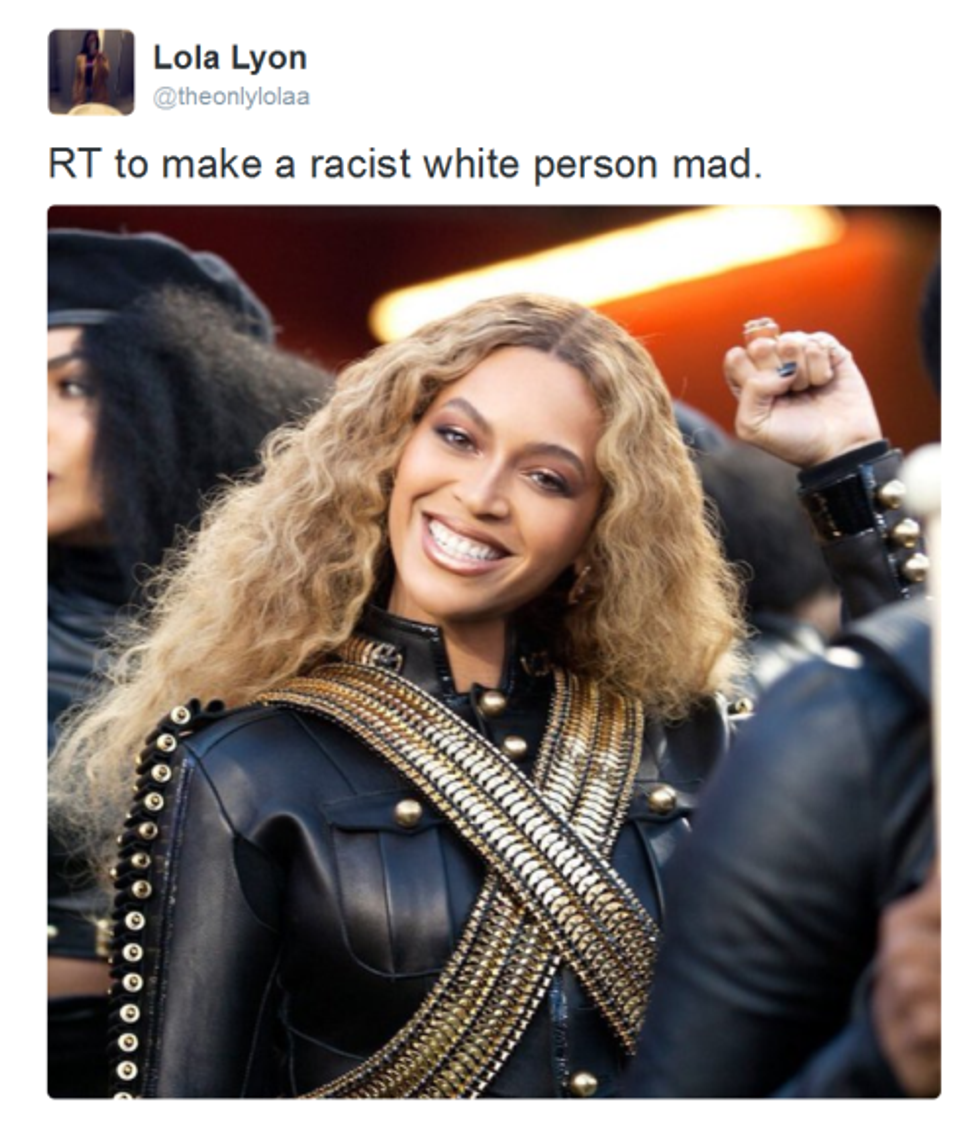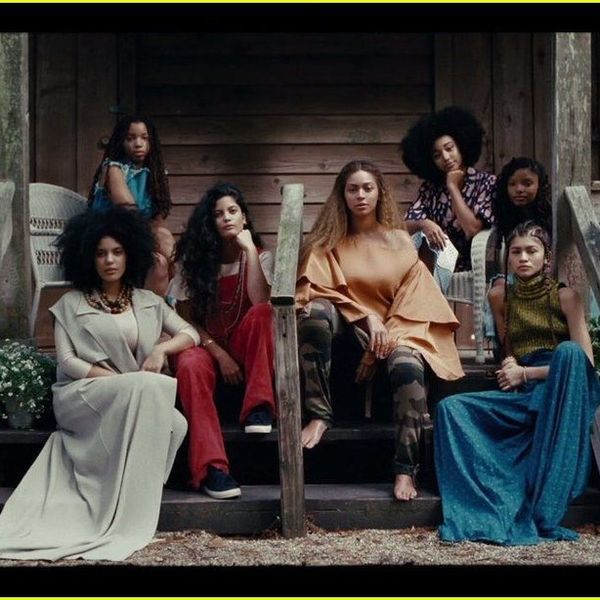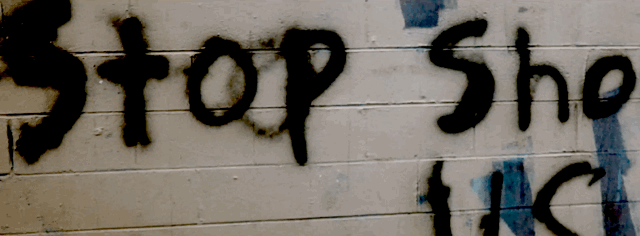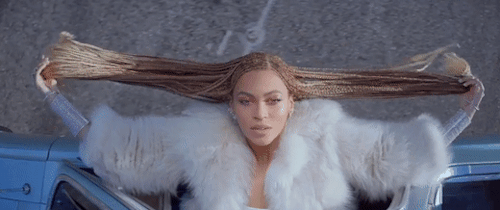Queen Bey has done it again and, as she intended, "cause[d] all this conversation."
Our Lady and Savior released a new single in February that took society by storm. If you didn't check her out when the video first hit the Internet, you surely saw her perform it in part at Super Bowl 50.
For most, it was an empowering tribute to minorities, primarily African-American women from the deep South, but she also highlighted people of color as a whole. She blatantly called attention to the current third-wave feminist movement, which is known for its focus on promoting the rights of different ethnicities, sexualities, and genders. On top of everything, Bey subtly included a shout out to the LGBT community as well. In short, it's iconic.
You could see where other, more conservative viewers may have a problem with this.

I know, for a fact, that those listeners with grievances are complaining about her being "pro-black." So? Being pro-black doesn't mean being anti-white. The Black Lives Matter movement doesn't mean that other lives don't matter.
In the video, Beyoncé brings attention to this in both a meaningful and careful manner. The scene between the dancing African-American boy in the black hoodie and the line of riot police officers is quintessential. Both sides raise their arms up, resembling the, "hands up, don't shoot," gesture that has become necessary imagery for the Black Lives Matter movement. The end result of the scene isn't violence, but quite the opposite— a standstill that could possibly lead to repose.
Looking back in time, Caucasians as a group have never been oppressed, in comparison to other ethnicities. The point is that white lives have always mattered. White people as a race have never had to undergo the societal struggles that African-Americans, regardless of their economic backgrounds, have endured, simply for their individual amounts of melanin. #BlackLivesMatter is a modern reminder that, in the 21st century, African Americans will not be mistreated or discriminated against. Again, that's OK.
It's just like the typical complaint about February being Black History Month. If you look at the way society functions, every other month is unofficially White History Month, as we often celebrate the accomplishments of Caucasian males and, sometimes, overshadow others as a result. It's OK to give other ethnicities this (I could talk about how race is just an institution created by society, but I'll wait until this settles in). White pride isn't necessary because society has never acted against white people for the pale tones of their skin. I've heard others say, "Oh, if you're referring to history and the times of slavery, I had nothing to do with that." It's the unfortunate truth that we still have societal ties to it, especially when looking at our patriarchal structure in all of its glory. The African American population is still suffering from the inherent effects of the original system, and that's something that people still like to turn a blind eye to.
You guys really think that an entire country was able to just get over institutional racism when schools were desegregated in 1954? When interracial marriage was legalized in 1967? A huge chunk of our population is still alive from that time period— may I mention, a portion of which fought for the exact opposite side— and you think they were all just able to get over it without any lasting effects? It's only 2016. We still have a lot of work to do.
Ana Kasparian from the Young Turks political commentary program said it best: "Are you just expecting African-American/black performers to just entertain you and not ever make you think about political issues that might make you feel a little uncomfortable?"
So, I don't pretend that I can relate to her lyrics, even after residing in the South for almost 16 years. Why? Well, I was born of both white and Hawaiian heritage. Do I know people personally who have "got hot sauce" in their bags? Absolutely. However, I also know that the song is not, in any way, shape or form, about me. That's OK. I have never felt the societal struggle that comes with being an African-American woman, so, while I can appreciate the song and the message behind it, I know that I am not the intended audience.
Now that we're on the same page, here are a few lyrics from her video, which is wrought with symbolism, that reference several active social movements in the United States right now.
"I like my baby heir with baby hair and afros."
For the viewers who would have to be physically blind to miss this, Bey lists a plethora of African-American stereotypes and, for your information, owns them. She rocks dreads in several scenes beautifully. She acknowledges the critiques of her daughter's hair by proudly asserting that she will keep Blue Ivy all-natural. There's nothing wrong with that.Additionally, Beyoncé consistently claims her lineage as a product of Alabama, Louisiana, and Texas and that "they never take the country out me." She mentions her preference for "Jackson 5 nostrils"— a shout out to African-American men everywhere, especially her man. She talks about how she'll "yellow-bone it," a reference to the slang phrase for African-American women with lighter skin tones. She includes scenes from church, a weave shop, and, of course, Mardi Gras.
There's no twisting it. She's certainly making an outright statement of pride for her roots and her ethnicity by naming the stereotypes thrown at her every day.
"OK, ladies, now, let's get in formation."
This one is a no-brainer. There's definitely some wordplay going on. She's telling her audience to come together as a group and, above all, get educated about the issues and the world around them.Take, for example, Hurricane Katrina, the natural disaster that absolutely destroyed New Orleans. Throughout the lyrics and video, she blatantly recalls it back into the limelight. As she poses on a cop car that is slowly being submerged, she's really alluding to one major question that has been repeated over the years: What really happened in New Orleans, a city with a majority of African-American citizens? There's been widespread criticism regarding the government's lagging response to Hurricane Katrina under the Bush administration. In one of the final scenes, she goes underwater with the NOPD police vehicle, representing the unfortunate reality of so many New Orleanians during those first few days.
"If he hit it right, I might take him on a flight in my chopper, 'cause I slay. Drop him off at the mall, let him buy some J's, let him shop up, 'cause I slay."
Not only does Queen Bey break stereotypical race roles, but she destroys traditional gender roles as well. In a number of parlor scenes, Bey poses as what is considered the conventional Southern belle, which is historically a role limited to white women. She manages to incorporate a few outfits reminiscent of "American Horror Story: Coven" as well, which was based in a New Orleans mansion.
However, it's her lyrics that appeal to the feminist movement. She discredits the traditional definitions of femininity and masculinity by acting as the dominant breadwinner and placing lust before love. She isn't searching for a husband, but a man who's good in the sheets. She talks about how she'll spoil him monetarily, as long as their sex is on point. She ends with a poignant statement: "I just might be the black Bill Gates in the making." Bey recognizes the power behind her womanhood and pushes it beyond the conventional boundaries.
"I came to slay, bitch. I like cornbreads and collard greens."
Listeners less familiar with New Orleans may not recognize the voice of Big Freedia during the interlude. However, her role in the song is unforgettable. Not only does she contribute to the embracing of Southern African-American stereotypes, but Big Freedia herself adds to the song's inclusiveness.
She's a gay man, fluid with her pronouns, who prefers to dress in drag and is a living legend in New Orleans bounce music and a prominent face for the LGBT community. Her presence in the song stands as an added element of the cultural aspect, specific to the Louisiana music scene, and to the LGBT community as a whole.
Beyoncé's most recent single is a bombshell, full of substance for those willing to pay attention. Is it something to be threatened by? Most definitely not. Is it something to listen to on repeat, while either, one, treasuring your ethnicity, or, two, acknowledging the beauty of African-Americans? The answer, my friends, is yes.
Before you try to bring down a modern-day queen, like Beyoncé, for "race-baiting," realize how flawed of an argument it is. At the end of the day, she slays and she knows it. What better role model could we ask for?


























